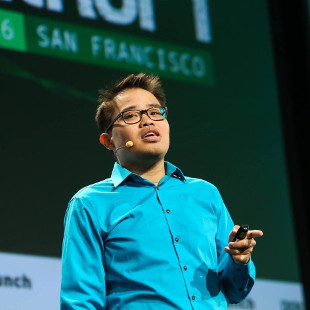 Speaking at a TechCrunch eventCOURTESY OF AMADO GULOYA materials and inorganic chemist by training, Amado Guloy is now dedicating 30 to 40 hours a week organizing a March for Science in San Francisco. As founder and chief executive officer of Rex Animal Health, which offers a “23andme-type test to look at the health and wellbeing of [livestock] animals,” Guloy was concerned when he saw reports of research restrictions and gag orders at the US Environmental Protection Agency (EPA) and Department of Agriculture (USDA). “We do have some slight commercial interests in ensuring those agencies are not silenced when it comes to science,” he said. But his reason for planning a march, he said, was more than personal. “This is about raising awareness,” Guloy told The Scientist: “This is what science has done, this is why data is important.”
Speaking at a TechCrunch eventCOURTESY OF AMADO GULOYA materials and inorganic chemist by training, Amado Guloy is now dedicating 30 to 40 hours a week organizing a March for Science in San Francisco. As founder and chief executive officer of Rex Animal Health, which offers a “23andme-type test to look at the health and wellbeing of [livestock] animals,” Guloy was concerned when he saw reports of research restrictions and gag orders at the US Environmental Protection Agency (EPA) and Department of Agriculture (USDA). “We do have some slight commercial interests in ensuring those agencies are not silenced when it comes to science,” he said. But his reason for planning a march, he said, was more than personal. “This is about raising awareness,” Guloy told The Scientist: “This is what science has done, this is why data is important.”
The Scientist: What prompted you to take the lead in organizing a satellite march in San Francisco?
Amado Guloy: We have an executive committee of a dozen people strong now . . . I’m acting as chair because, in running companies, you have to know how to be organized and put together people, so that was one of the things I brought to the table.
I got involved initially through the Reddit group, when people were talking about it [the March for Science in DC], I was like, Alright, this makes sense. Especially for me, I was worried about the silencing of the USDA and the EPA. . . . When people started organizing [nationwide], I said, Alright, well I’m in San Francisco, let’s do ...




















